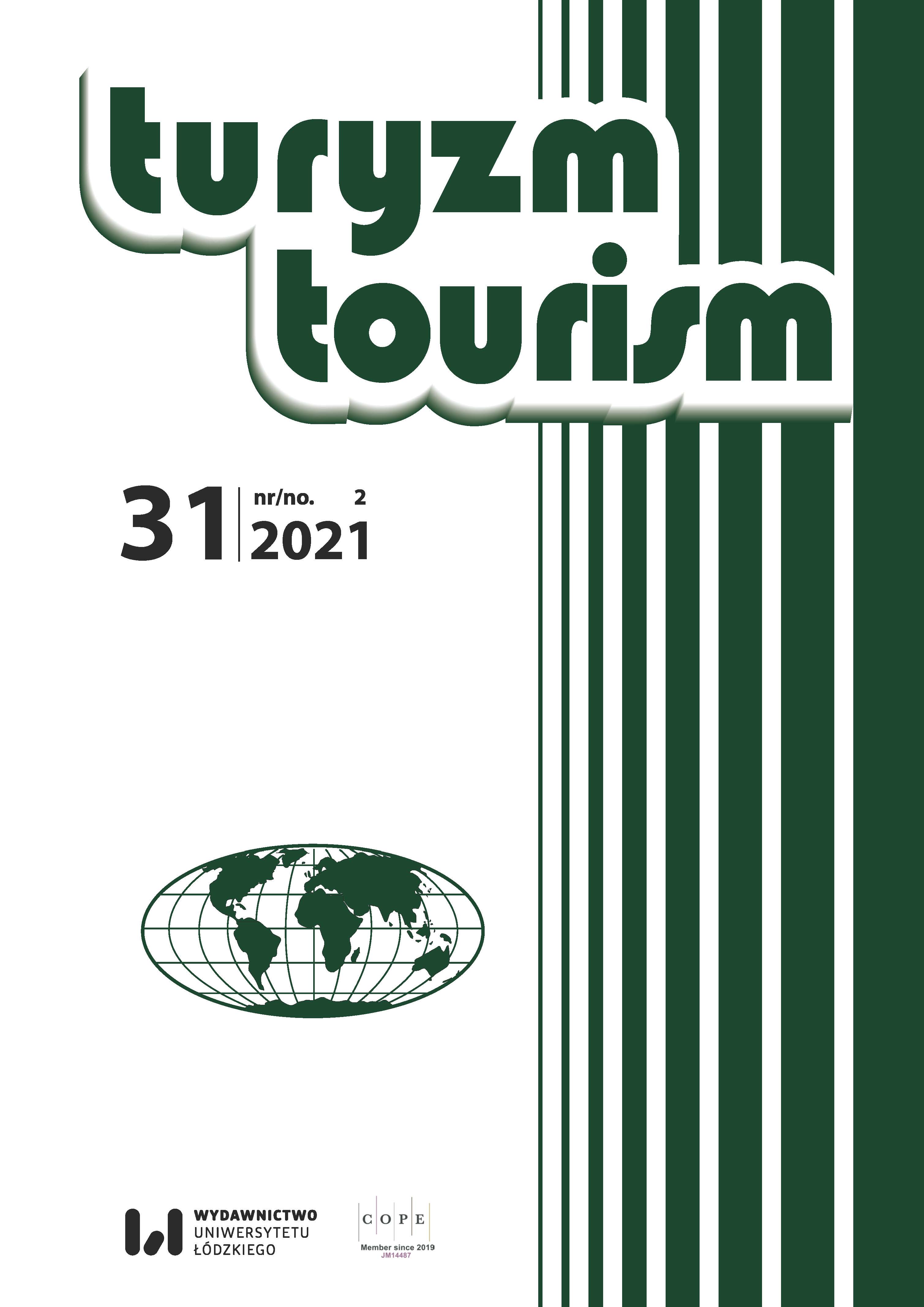Badania fenomenologiczne doświadczeń osób korzystających z couchsurfingu
DOI:
https://doi.org/10.18778/0867-5856.31.2.03Słowa kluczowe:
couchsurfing, turystyka, zakwaterowanie, podróże, ekonomia współdzieleniaAbstrakt
Couchsurfing (CS) jest obecnie uważany za alternatywną platformę, która odzwierciedla zmiany w preferencjach dotyczących zakwaterowania turystycznego. Serwis CS, oparty na ekonomii współdzielenia, daje możliwość zaoferowania podróżnym różnorodnych doświadczeń turystycznych oraz zakwaterowania. Celem niniejszego artykułu jest przedstawienie informacji na temat związanych z podróżowaniem motywacji, uprzedzeń, doświadczeń osób korzystających z couchsurfingu oraz postrzegania przez nie ryzyka. Artykuł stanowi oryginalną wartość w literaturze przedmiotu, jako że jest w nim zgłębiane zagadnienie użytkowników wspomnianego portalu w aspekcie fenomenologicznym. Wyniki najnowszych badań świadczą o tym, że pragnienie zwiedzania miejsc, w których się wcześniej nie było, poznawania nowych ludzi i różnych kultur motywuje uczestników. Analizy pokazują, że większość uczestników couchsurfingu nie miała uprzedzeń ani wrażenia istnienia ryzyka, jednak osobom, które wybrały tę formę zakwaterowania po raz pierwszy, towarzyszyły takie odczucia. Zaobserwowano również, że uczestnicy są bardzo zadowoleni ze swoich doświadczeń związanych
z couchsurfingiem i zamierzają ponownie skorzystać z tego rozwiązania.
Pobrania
Bibliografia
Aktan, E. (2018). Sosyal medyanın turizm pazarlamasındaki rolünün değerlendirilmesi’. Journal of Gastronomy Studies, 6 (3), 228–248. https://doi.org/10.21325/jotags.2018.280
Google Scholar
DOI: https://doi.org/10.21325/jotags.2018.280
Anderson, C. (2012). The impact of social media on lodging performance. Ithaca: Cornell hospitality report.
Google Scholar
Ayers-Greenidge, E. (2012). Free associations: An exploration of guests’ experiences in the couchsurfing exchange. California: Wright Institute.
Google Scholar
Başarangil, İ. (2019). Sosyal medyanın tatil tercihlerine etkisi: kırklareli üniversitesi turizm fakültesi öğrencileri üzerine bir araştırma. Journal of Tourism and Gastronomy Studies, 7 (2), 839–852.
Google Scholar
DOI: https://doi.org/10.21325/jotags.2019.395
Bialski, P. (2012). Technologies of hospitality: How planned encounters develop between strangers. Hospitality and Society, 1, 245–260. https://doi.org/10.1386/hosp.1.3.245_1
Google Scholar
DOI: https://doi.org/10.1386/hosp.1.3.245_1
Brown, R. (2009). Public relations and the social web: How to use social media and web 2.0 in communications. New Jersey: Kogan Page Publishers.
Google Scholar
Chen, D.-J. (2018). Couchsurfing: Performing the travel style through hospitality exchange. Tourist Studies, 18 (1), 105–122. https://doi.org/10.1177/1468797617710597
Google Scholar
DOI: https://doi.org/10.1177/1468797617710597
Chung, J., Buhalis, D. (2009). Virtual travel community: Bridging travellers and locals. In: N. Sharda (ed.), Tourism Informatics: Visual travel recommender systems, social communities, and user ınterface design (pp. 130–144). Hershey: Information Science Reference. https://doi.org/10.4018/978-1-60566-818-5.ch008
Google Scholar
DOI: https://doi.org/10.4018/978-1-60566-818-5.ch008
Couchsurfing (2021). Retrieved from: https://www.couchsurfing.com (10.01.2021).
Google Scholar
Dén-Nagy, I., Király, G. (2014). How to explain couchsurfing’s success? Review of Sociology, 24 (4), 32–53.
Google Scholar
Doyle, C. (2016). Generation Y. A dictionary of marketing. Oxford: Oxford University Press.
Google Scholar
Franz, M. (2013). Couchsurfing: Experiences, reputation, references and decision-making in an online hospitality network. Master Thesis, University of Jyväskylä.
Google Scholar
Güler, A., Halıcıoğlu, M.B., Taşğın, S. (2013). Sosyal bilimlerde nitel araştırma yöntemleri. Ankara: Seçkin.
Google Scholar
Hanchuk, O., Bondarenko, O., Varfolomyeyeva, I., Pakhomova, O., Lohvynenko, T. (2020). Couchsurfing as a virtual hospitality network and a type of sustainable youth tourism. E3S Web of Conferences, 166, 09005. https://doi.org/10.1051/e3sconf/202016609005
Google Scholar
DOI: https://doi.org/10.1051/e3sconf/202016609005
Huang, C.D., Goo, J., Nam, K., Yoo, C.W. (2017). Smart tourism technologies in travel planning: The role of exploration and exploitation. Information & Management, 54 (6), 757–770. https://doi.org/10.1016/j.im.2016.11.010
Google Scholar
DOI: https://doi.org/10.1016/j.im.2016.11.010
İmre, N. (2020). Turizm sektöründe sosyal medya kullanımı üzerine bir değerlendirme. Türk Turizm Araştırmaları Dergisi, 4 (2), 1655–1670. https://doi.org/10.26677/TR1010.2020.418
Google Scholar
DOI: https://doi.org/10.26677/TR1010.2020.418
Kang, M., Schuett, M.A. (2013). Determinants of sharing travel experiences in social media. Journal of Travel and Tourism Marketing, 30 (1–2), 93–107. https://doi.org/10.1080/10548408.2013.751237
Google Scholar
DOI: https://doi.org/10.1080/10548408.2013.751237
Lauterbach, D., Truong, H., Shah, T., Adamic, L. (2009). Surfing a web of trust: Reputation and reciprocity on couchsurfing.com. In: 2009 International Conference on Computational Science and Engineering (pp. 346–353). Vancouver: IEEE Computer Society. https://doi.org/10.1109/CSE.2009.345
Google Scholar
DOI: https://doi.org/10.1109/CSE.2009.345
Molz, J.G. (2012). Couchsurfing and network hospitality: ‘It’s not just about the furniture’. Hospitality & Society, 1 (3), 215–225. https://doi.org/10.1386/hosp.1.3.215_2
Google Scholar
DOI: https://doi.org/10.1386/hosp.1.3.215_2
Moreira, M.A.N., Gomes, C.L. (2018). The hospitality in the social network Couchsurfing: Crossing the virtual threshold in Jaguarão, in the extreme south of Brazil. Revista Brasileira Pesquisa Turismo, São Paulo, 12 (2), 1–24. https://doi.org/10.7784/rbtur.v12i2.1399
Google Scholar
DOI: https://doi.org/10.7784/rbtur.v12i2.1399
Picard, D., Buchberger, S. (2013). Couchsurfing cosmopolitanisms can tourism make a better world. New York: Transcript-Verlag. https://doi.org/10.14361/transcript.9783839422557
Google Scholar
DOI: https://doi.org/10.1515/transcript.9783839422557
Pultar, E., Raubal, M., Goulias, K. (2012). The role of geography in couchsurfing social network activities. International Conference on Geographic Information Science, Avingon.
Google Scholar
Rosen, D., Lafontaine P.R., Hendrickson B. (2011). Couchsurfing: Belonging and trust in a globally cooperative online social network. New Media & Society, 13 (6), 981–998. https://doi.org/10.1177/1461444810390341
Google Scholar
DOI: https://doi.org/10.1177/1461444810390341
Şahbaz, A. (2019). Airbnb ve Couchsurfing kullanıcılarının paylaşım ekonomisine katılım motivasyonları arasındaki farklılıklar Türkiye örneği. İstanbul Üniversitesi, Yüksek Lisans Tezi.
Google Scholar
Schuckert, M., Peters, M., Pilz, G. (2017). The co-creation of host – guest relationships via CouchSurfing: A qualitative study. Tourism Recreation Research, 43 (2), 230–234. https://doi.org/10.1080/02508281.2017.1384127
Google Scholar
DOI: https://doi.org/10.1080/02508281.2017.1384127
Skog, C. (2012). Couchsurfing – A choice for travelers. Haaga-Helia University of Applied Sciences, Bachelor’s Thesis, Degree Program in Tourism, Finland.
Google Scholar
Spitz, T. (2017). The Commodification of hospitality. An analysis of tourism encounters between interculturality and difference in regard to Turkish Couchsurfing experiences. Graduate Thesis. Kadir Has Unıversıty, Graduate School of Social Sciences.
Google Scholar
Voyant-tools (2021). Cirrus. Retrieved from: https://voyant-tools.org/docs/#!/guide/cirrus (14.01.2021).
Google Scholar
We are social (2021). Retrieved from: https://wearesocial.com/digital-2020 (14.01.2021)
Google Scholar
Weber, M. (2009). Marketing to the social web: how digital customer communities build your business. Second Edition. New Jersey: John Willey and Sons Inc. https://doi.org/10.1002/9781118258125
Google Scholar
DOI: https://doi.org/10.1002/9781118258125
Xiang, Z., Gretzel, U. (2010). Role of social media in online travel information search. Tourism Management, 31 (2), 179–188. https://doi.org/10.1016/j.tourman.2009.02.016
Google Scholar
DOI: https://doi.org/10.1016/j.tourman.2009.02.016
Zgolli, S., Zaiem, I. (2018). CouchSurfing: A new form of sustainable tourism and an exploratory study of its motivations and its effect on satisfaction with the stay. International Journal of Culture, Tourism and Hospitality Research, 12 (1), 130–142. https://doi.org/10.1108/IJCTHR-02-2017-0015
Google Scholar
DOI: https://doi.org/10.1108/IJCTHR-02-2017-0015
Pobrania
Opublikowane
Jak cytować
Numer
Dział
Licencja

Utwór dostępny jest na licencji Creative Commons Uznanie autorstwa – Użycie niekomercyjne – Bez utworów zależnych 4.0 Międzynarodowe.










